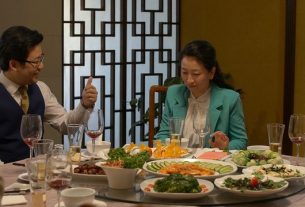By Gao Shan
Time elapsed quickly. Summer ended and autumn came.
A new term began. Shan came into the classroom with the prizes she bought for her students. The students stood up and greeted her as usual and then sat down waiting for her to speak.
She didn’t wear a long face and reprimand the students who had poor exam results one by one as usual, but instead she smiled and said, “Class, in the final exams of last term, the exam results of our class were unfavorable, but every one of you has made some progress, meagerly or plentifully, which is the fruit of your efforts. Today, I specially bought some awards for you. I hope you don’t grow complacent and can keep up the good work.” After she said like this, the original atmosphere of gloom in the class became relaxed a lot, from which it could be seen that the students’ nervousness became relaxed. Right after that, she distributed the prizes to them. Holding their own awards, they looked at it up and down and couldn’t put it down, being very excited. They looked at each other, smiles appearing on their faces. Seeing this scene, she felt very happy …
During the break, through the window she saw the students playing briskly in the playground, their innocent and lively smile faces like flowers blooming in the sun; and then scene after scene of the days past drifted into her mind …
She was a head teacher in a primary school. Having seen and heard many matters, she knew that as for a teacher, the teaching results were comparable to his label and in others’ eyes, the results were also the same as his strength. Therefore, in order to improve her teaching results, she racked her brain to try every means she could. Finally, guided and helped by her seniors, she approved of the word “Good pupils are to be brought up by strict teachers” said by them and thought it was right: The students must be managed, pressed and suppressed, because as long as they were given an easy time, they would be unbridled, without restraint, cut classes and make a mess of their homework. Therefore, in front of the students, she always had the final say, with a countenance of strict reflection. If anyone didn’t obey her, she would rebuke him or make him stand as a punishment. This made them not dare to get close to her and her relationship with the students was like cat and mouse, especially with those who had poor school performance. Every time when she coached them in homework singly, they would be trembling with fear, afraid that they would say anything wrong and be criticized; even when they walked, they would choose to walk along the roadside, for fear that they would come into her sight. In order to get good results in the final exams, she put forth enough energy and led her students to review the lessons hard for more than two months, being exhausted physically and mentally. However, in the end, the results actually ranked last. She really could not accept the truth. What’s worse, the headmaster even rebuked her in front of others, “Has your heart been in the teaching? You have taught the students like this. Can you live up to their parents? Are you capable or not on earth?” These sarcastic and rude words made her feel embarrassed and thus her mood was lowered so much that it hit the bottom. She was very confused: I’ve striven and tried every means I can with my heart, but why do the results reach such a terrible point? I really don’t know how to do this work in the future.
Feeling many grievances, she, dragging her heavy steps, arrived at home and poured out all the sufferings in her heart to her mother. Her mother didn’t stand by her side and say some words of understanding and comfort as usual, but instead she said to her seriously, “In these days, in order to improve your teaching results, you labored very hard—preparing the lessons, correcting the students’ homework and coaching them from early to late, but the results still haven’t been improved. There have to be lessons that you must learn. You should know that you are a Christian. Whether in our work or life, we have to have a place for God in our hearts, have a heart that relies on God and looks upon Him, and follow His teachings of us. Only thus can we receive His blessings. If you always want to rely on your own little cleverness and ability to work, and educate your students by scolding, pressing and suppressing pestering them, or act according to the axiom ‘Good pupils are to be brought up by strict teachers,’ you’re destined to fail. If you want your students to get good scores, first you should learn to rely on God, look to God and believe that all things are in the hands of God.”
After hearing her mother’s words, She hung her head ashamedly and became immersed in thought. Later on, she saw the following words from God: “People spend most of their time living in a state of unconsciousness. They do not know whether they should rely on God or on themselves. They then tend to choose to rely on themselves and the beneficial conditions and environments around them, as well as on any people, events, and things that are to their advantage. This is what people are best at. What they are worst at is relying on God and looking up to Him, because they feel looking up to God to be too much of a bother—they cannot see, they cannot touch—and they feel that doing so is vague and unrealistic. Thus, in this aspect of their lessons, people perform the worst, and their entry to it is the shallowest. If you do not learn how to look up to and rely on God, you will never see God work in you, guide you, or enlighten you. If you cannot see these things, then questions such as ‘whether God exists and whether He guides everything in the life of mankind’ will, in the depths of your heart, end with a question mark rather than a period or exclamation mark.” “There is a serious problem here, which is that people do many things in dependence on their experience and the rules they have understood, and on certain human imaginings. They can barely achieve the very best result, which comes through clearly understanding God’s will by looking up to Him and praying to Him, and then relying on His work and guidance. For this reason, I say that the greatest wisdom is to look up to God and rely on Him in all things.”
After reading God’s words, she felt as if she were awakening from a dream. She recalled: In these days I indeed became distant from God and had no place for God in my heart. During my time teaching, I didn’t rely on God, look to Him, nor did I seek His will; instead I thought that I had knowledge and ability and grasped much experience in teaching, so I relied on my own ways to work. I firmly believed that “Good pupils are to be brought up by strict teachers”, so when the students didn’t understand what I had taught in class, I would jump on them, assign them to do lots of practice problems, or force them to copy their homework by hand multiple times. Though my students and I were all exhausted physically and mentally, the results haven’t been improved; what’s worse, when the students saw me, they all distanced themselves far from me, not daring to approach. Aren’t those the bitter results brought about by relying on myself not on God? Depending on my own ability and Satan’s rules for survival to do my own work really couldn’t accomplish anything in the end! Thinking of this, she couldn’t help but shed tears of self-accusation and remorse. She made a resolution that in the following teachings, she would put God’s words into practice and no longer did things relying on satanic philosophies or her own experience and ability; instead she would rely on God, look to Him and live by His words.
“Ring, ring …” The pleasing bell for class pulled her thought back and the students also continuously went back to their own seats. She remembered: In this math class, I will teach multiplication of two-place decimals. Then can those who can’t even correctly work out addition and subtraction problems within 20 or recite the multiplication tables be able to grasp this new knowledge? How should I explain the lesson so that I can teach them? Looking at the teaching plan she wrote elaborately, she still didn’t feel at ease. Suddenly, she remembered a line of God’s words: “I say that the greatest wisdom is to look up to God and rely on Him in all things.” After being enlightened by God, she immediately prayed to Him silently within: “O God, I’ll entrust all things to You. May You lead and guide me. I believe that whether I can teach this lesson clearly and whether the students can learn it are controlled by You. I only wish to rely on You and look to You and no longer teach them by my own ability.” After she prayed, her heart settled somewhat.
Right after that, she took out the teaching aids and learning tools that she had prepared, and began to give the lesson. She showed the examples first and then analyzed the problems to determine their meanings as usual, but the difference was that she frequently cried out to God and looked to Him within, asking Him to lead her and let her know how to teach the lesson so that she could get a better effect. When it came to the time of asking the students to write out an equation, though she knew today what she talked was simple multiplication, she estimated that those slow ones shouldn’t be able to learn it right away. But unexpectedly, one of them actually got the answer. She was very surprised and encouraged him at once. Next she would teach vertical calculation. This was the difficult point in this lesson. She no longer had her own plans: No matter whether those slow students could learn or not, she was willing to entrust all things to God. What she could do was teach the lesson normally and lead them bit by bit with all her heart and ability. What she did not expect was that when she examined whether everyone got the answer, she found the slow students actually did that, which greatly exceeded her expectations. She knew clearly in her heart this was all the result reached by relying on God.
“Ring, ring …” The bell at the end of the lesson rang when Shan was praising the students. Going out of the classroom, she thought: “In this class, my students’ learning atmosphere was warm and strong. When they do the practice problems, their accuracy actually reached 90%. When we interacted with each other, the inspiration continuously ignited. What a perfect lesson it was! These were all God’s deeds!” She was very happy and continuously thanked and praised God in her heart. Through the teaching in this lesson, she had tasted the sweetness of relying on God and looking to Him. She knew the reason that she could give such a wonderful lesson was because God allowed her to learn to rely on Him and look up to Him by her mother’s reminder. She understood that only by relying on God could she give a good lesson.
In the following days, she entrusted all the things in her work to God, letting Him lead and guide her and no longer relied on her brain, calibers and ability to do that. After experiencing in this way for a period of time, she felt a relaxation and joy as never before in her heart. Moreover, she was surprised to find that these slow students actually not only learnt the knowledge she had taught for four years in the past but also grasped the new knowledge very well. From this matter, she saw God’s almightiness and His rule: As long as man sincerely relies on God and looks to Him, nothing is impossible for God.
Because of her changes, the students also became positive. They could ask her questions proactively and she no longer wore a long face and scolded them blindly; instead she smiled at them and coached them patiently. Their relationship became warm and harmonious and there formed an unprecedented, positive and motivated learning atmosphere in the class. The students’ parents also said that their children loved studying more than last term. After hearing that, she felt that nothing was more gratifying to her than this. She knew that it was God’s words that had changed her, so the people, events, and things around her also changed. Meanwhile, she also had a new understanding of the word “Good pupils are to be brought up by strict teachers.” This word was experience that people had summarized. It was not the truth and didn’t work in practice. Only God’s words were truth and could give her the correct path of practice.
A gust of autumn air blew over and some petals, like butterflies, marked the graceful curves and floated down beside the roots of the flowers. This stirred up feelings in her, so she couldn’t help but recite: “The fallen blossoms are not an unfeeling thing: Though turned to mud, they’d nurture flowers’ growth next spring.” The fallen petals even had the sense of gratitude, let alone man. With a grateful heart, she calculated all the things God had done on her and truly tasted that relying on God, looking to Him and practicing His words sincerely were indeed the greatest wisdom …



